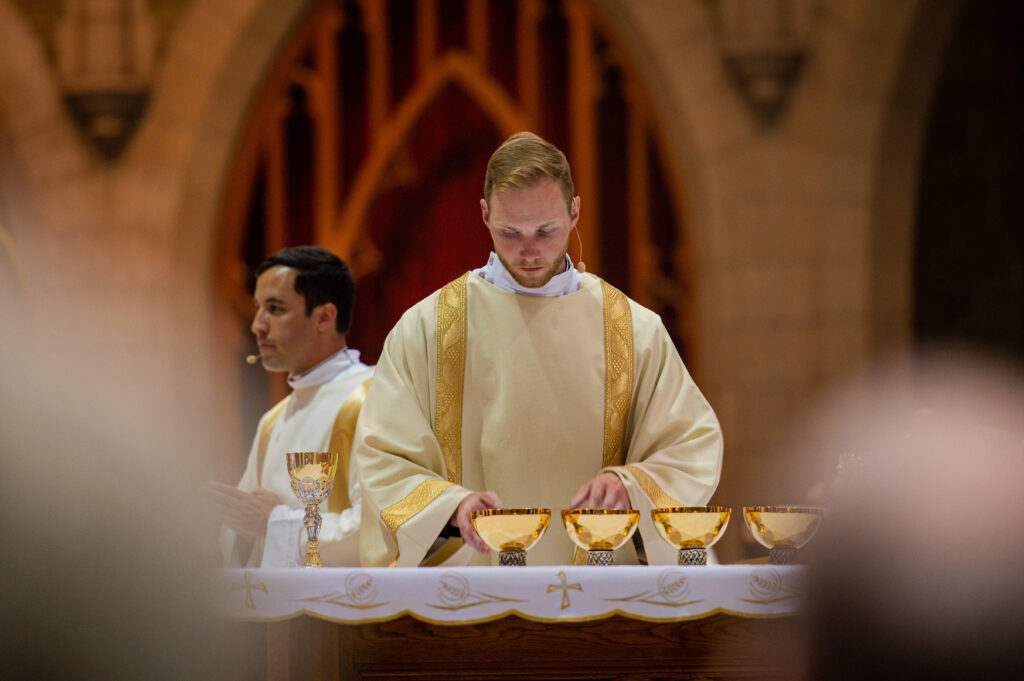Deacon Jake Mullin is the newest transitional deacon in the Archdiocese of Edmonton. He was ordained on May 26 by Archbishop Richard Smith at the St. Joseph’s Basilica. Deacon Jake grew up in Spruce Grove and he entered St. Joseph Seminary in 2016. He will be ordained to the priesthood on June 13, 2024 at St. Joseph’s Basilica, Edmonton at 7pm.
We had the opportunity to interview him a few days after his diaconal ordination to hear his vocation story thus far and explore how he will be serving the Archdiocese over the summer.
When we were booking this interview, it was so great to see your name signed as “Deacon Jake!”
Yes, I’m still getting used to that! I still forget to sign as “Deacon” sometimes and then I think, oh there was a missed opportunity.
It’s only been three days since I was ordained and yesterday, I was at my home parish on Sunday for the morning mass. And so people would congratulate me and some people would say, you know, “Congratulations, Father.” Not quite! There can be some confusion, but it’s all pretty special.
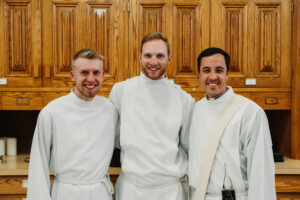
For someone who’s not familiar, what is a transitional deacon?
I would say that there’s two aspects to it. So of course, there’s the transitional part, and then the deacon part.
A deacon is ordained to help assist the priest. Historically, it says in (the book of) Acts that the deacons were ordained to wait on tables, that the apostles could focus on prayer and ministry, in a sense of sacraments, as we understand them now. In our current time, we have permanent deacons. So those are usually men who are married, and they discern a call to join Holy Orders. They remain a deacon the rest of their life, they assist the priests on the weekends at Mass with preaching, baptisms, weddings. However, deacons cannot celebrate Mass, and they can’t do Reconciliation.
I’m a transitional deacon. So that means that I’m a deacon, but only temporarily. So unlike the permanent deacons who are usually married, and they remain in that state of life for the rest of their life, I’m ordained as a deacon as a step towards priesthood. Hopefully I will be ordained as a priest next summer, God willing. So the transitional deacon is basically just the second last step in the journey of a seminarian prior to presbyteral (priestly) ordination.
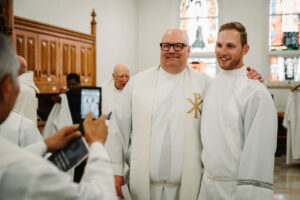
What was the ordination like for you?
So the first thing I was feeling a little bit flustered because I was running behind, I didn’t get there quite as early as I’d hoped. And so I got there, and I was just hurriedly trying to get everything ready that I needed. And then it started.
It wasn’t until after I’d been ordained, once I had been invested as a deacon. And then we’re doing the Litany of Saints and I’m prostrated in front of the altar. And I just had that moment to kind of breathe and really think like, wow, this really happened. That’s pretty, pretty surreal, you know?
After the Mass people were taking pictures, or receiving blessings, but I was still just standing there trying to think, to process, what just happened. All of a sudden, I’m wearing all this deacon clothing and I’m giving blessings. That’s really crazy, so I’m still processing that!
But you know, this is something that I’ve been working towards for many years. So now I am a deacon, but I’m still nervous about assisting at the Mass and giving blessings, things like that. But it’s not as difficult as I thought it might be. In some ways, it almost feels natural, because I’ve spent so much time looking forward to it.
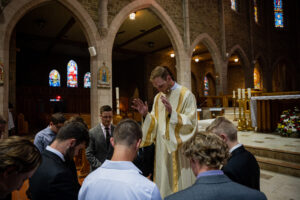
What’s the biggest shift from being a seminarian to now being an ordained deacon and a seminarian? How does this change your relationship with the Mass?
Well, because it’s summertime, and because I have a summer job, there isn’t any major day to day change. I’m also super conscious of the fact that I need to get my Liturgy of the Hours in throughout the day, because I’ve promised before the bishop and the people of God, and God Himself, that I would do that. So I’m recommitting myself to doing that practice.
This fall, you will be serving as a deacon on the weekends at Resurrection and Assumption parishes in Edmonton with Fr. Roger Niedzielski. What are you looking forward to the most with that assignment?
I’m looking forward to just serving with Fr. Roger! I was with him for one year in seminary, so it’s kind of special that I get to work with him now and hopefully get to know him a little bit better and build up the relationship. But also having the opportunity to meet new people, build new relationships, and really experience what it’s like to be a deacon, albeit only on the weekends.
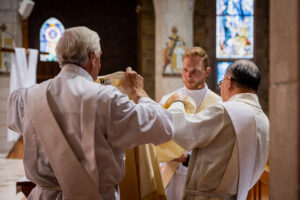
This summer you will be serving as a program coordinator at Our Lady of Victory Camp. What will that look like?
Yes, so in conjunction with another team member, I will be filling out the schedule for each week of camp. Our role is basically to be a liaison between the team and the volunteers.
I will be more behind the scenes as far as the day-to-day operations of the camps and now, because I’m ordained, I’ll also be able to give sessions on the Mass, maybe lead a Liturgy of the Word or do Adoration and Benediction, things like that.
When you think about the future of the Archdiocese of Edmonton, what do you hope to see more of in our local Catholic culture?
Well, as a seminarian, you often get asked the question, “What’s going on vocations? Is God not calling people to priesthood or religious life anymore?”
It seems like there’s this scarcity or absence of people answering the call. But I don’t think it’s as simple as that. It’s not that God isn’t calling people.
I think it’s just that people aren’t answering the call, or they’re not even in a place where they’re open to hearing God’s call in their life. Society has very much moved away from the Church, so how many people would even be thinking about the priesthood as a potential part of their future?
So I hope to see more of families being supportive and of nurturing these vocations within their children, if their children may be called. Just creating a culture of openness, where people that might feel a call can have the courage and support that they need to pursue that.
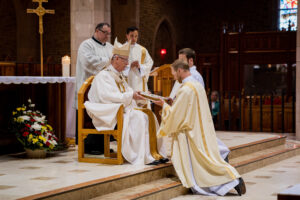
You’ve been at seminary for almost eight years! What are you most looking forward to in your last year?
I’m really hoping to solidify a lot of the relationships which I have. Something that’s been on my heart has been the need for ongoing formation and the need to integrate what I’m learning in seminary into my life instead of just relying upon the system. Because once you’re finished seminary, your support network of the schedule of the seminary and of your brothers, that won’t be there in the same way.
I want to really concretize or integrate everything I am receiving in the seminary – especially my friendships with my brothers – and to keep being vulnerable and staying committed to my prayers.
Another part of this last year at seminary is stepping into more of a leadership role. So as you get further along in seminary, people tend to look up to you more, even if you’re not ordained yet. The Vatican also recently changed some aspects of the seminary process, and after this year it looks like ordained deacons will no longer be staying at the seminary, so any of us who are ordained as deacons this year, are going to be the last deacons in the seminary! So with that in mind, I really want to set a good example and live out my vocation as best as I can.
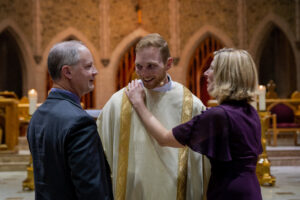
When you think about your first year of seminary, what is one perspective that has changed for you?
Well, when I first entered seminary there were only a few priests who I really knew, and I didn’t know many younger priests. So there was still a lot of confusion about what the role of the priest is. You go to Mass and you’re in the pew and the priest is just up there, in the sanctuary. It can feel like a gap.
But then you get to know so many more priests in seminary and you see these men who you admire become ordained and say the Mass and it’s like, wow, there’s something super, super powerful about this. It’s deeply inspirational. You know them as priests, and you also know them as humans like the rest of us.
It all makes the idea of priesthood to me seem a lot more universal, right? Like, no two priests are exactly the same. And so that’s why you have each priest with their own gifts and talents with which they’re building up the Body of Christ.
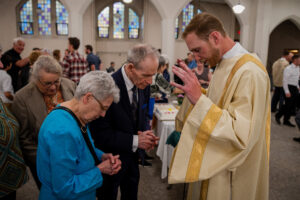
What would you say to any men, especially young men, who may feel that nudge of the Holy Spirit to look into seminary but they’re hesitant or they’re fearful?
I would, I suppose, echo the words of Jesus in the Gospels: Be not afraid.
He’s got a plan for you. If you’re meant to be ordained, that’s going to be your path to heaven, ultimately, right? So following that call is the best thing.
God wants the best for each one of us. So my advice to anybody who thinks they may have an inkling of a calling, or some desire, to just be open and bring it to prayer. And to reach out!
There’s lots of young priests or seminarians, and we’re good to talk to. We’re happy to share our experiences and offer support so you don’t have to do this alone. God’s with you and the people of God, the Church, is supporting you as well.
Click here to learn more about St. Joseph Seminary and the process of becoming a priest in the Archdiocese of Edmonton.
To hear more stories about the Catholic faith coming alive in the Archdiocese of Edmonton, subscribe to our weekly newsletter, The Window.
(This interview has been edited for clarity and brevity)
Jenny Connelly – Archdiocese of Edmonton

